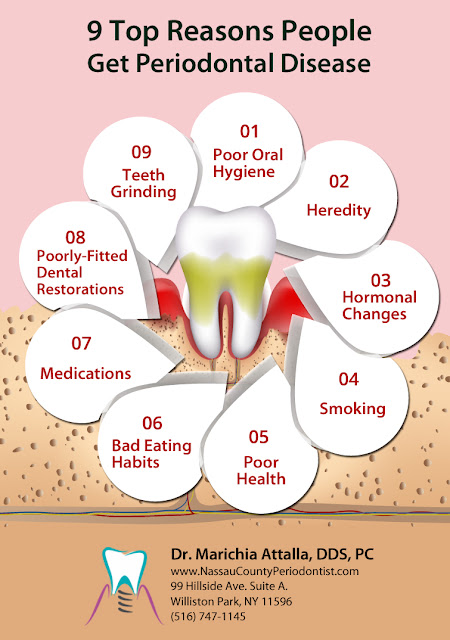Reports show that approximately 47% of American adults between the ages of 20 to 64 suffer from some form of periodontal disease or inflammation around the tooth.
Periodontal disease, or periodontitis, is a variety of inflammatory diseases impacting the tissues that enclose and support the teeth and is characterized by the pulling away of the gums and the formation of pockets or gaps between the tooth and gums that become infected.
In periodontal disease, plaque and bacteria spreads and accumulates beneath the gum line, and as the body's immune system fights this spread of bacteria, the body's natural response to the infection, in addition to the toxins from the bacteria, begin to break down the connective tissue and bone that attach the teeth. Left untreated, periodontal disease can lead to the gradual loss of the bone around the teeth, which over time can cause the loosening and loss of teeth.
There are many causes of periodontal disease. The top 9 causes include:
1. Poor Oral Hygiene
The human mouth is full of bacteria, which when combined with mucus and other particles, continuously form a sticky, colorless film, or plaque, on the teeth.
Daily flossing and brushing help keep plaque at bay. However, plaque that is not removed can harden and form what is known as tartar, which can only be removed by a professional.
Tartar is a breeding ground for bacteria, and if it is left untreated for too long, it can eventually lead to gingivitis, which in turn can lead to periodontal disease.
2. Heredity
If there are known cases of periodontal disease within your family, there is an increased possibility that you may develop the disease, as well. However, good hygiene combined with regular dental check-ups can help reduce this risk.
3. Hormonal Changes
Hormonal changes in the female body, such as puberty, etc., can make the gums sensitive, making gums more vulnerable to gingivitis.
4. Smoking and Tobacco Consumption
Smoking is a major risk factor in the development of periodontal disease and can also lower the chances for successful treatment, as it may affect the natural ability of the gums to repair themselves. Chewing tobacco may also increase your risk.
5. Poor Health
You are at a greater risk of developing periodontal disease if you suffer from poor nutrition. Furthermore, certain illnesses or diseases, such as diabetes, Cancer, and AIDS and their treatment, can also increase your risk.
6. Bad Eating Habits
The kind of diet you follow can sometimes affect your gum health. For instance, a diet high in starch and sugar can have a negative impact on the health of your gums because it contributes to plaque buildup and affects the body's immunoinflammatory responses.
7. Medications
There are some medications that can cause an out-of-the-ordinary overgrowth of the gum tissue, which can make it challenging to keep your gums and teeth clean and lead to plaque buildup. Also, saliva provides a sort of protective barrier in your mouth; however, many prescription and over-the-counter medications can decrease saliva flow, which can leave your mouth susceptible to gingivitis and other infections.
8. Poorly-Fitted Dental Restorations
Sometimes dentures and other dental restorations can be ill-fitted, which can cause your gums to become irritated and lead to infection.
9. Teeth Grinding
If you have a habit of clenching or grinding your teeth, then you may be at risk of developing periodontal disease. Teeth clenching or grinding can weaken your teeth after a while, making them more vulnerable to periodontal disease and other conditions.
Periodontal disease can be prevented by brushing your teeth twice daily with a fluoride toothpaste, flossing regularly to remove plaque from between the teeth, and attending regular dental check-ups.
For those who suffer from periodontal disease, damage caused by the disease can be reduced with regular deep cleanings in addition to following good oral health practices. Regular appointments with your periodontist or dentist should also be scheduled to keep your mouth healthy and clean.
If deep cleaning does not remedy inflammation and deep pockets, then surgery may also be performed to reduce periodontal pockets to help make it easier to keep the area clean. Bone and tissue grafting may also be performed to help regenerate any gum tissue or bone loss associated with the disease.
About the Author
Dr. Marichia Attala is a leading Periodontist in Nassau County. Learn more by visiting her website at NassauCountyPeriodontist.com
Additional References

Comments
Post a Comment
Posts with links will not be approved